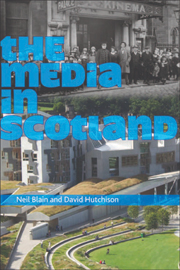Book contents
- Frontmatter
- Contents
- Preface
- Framing the Discussion
- 1 A Cause Still Unwon: The Struggle to Represent Scotland
- 2 Scots, English and Community Languages in the Scottish Media
- 3 Communications Policy
- The Historical Context
- Screen and Sound
- Themes and Futures
- Select Bibliography
- Notes on Contributors
- Index
3 - Communications Policy
from Framing the Discussion
Published online by Cambridge University Press: 05 August 2013
- Frontmatter
- Contents
- Preface
- Framing the Discussion
- 1 A Cause Still Unwon: The Struggle to Represent Scotland
- 2 Scots, English and Community Languages in the Scottish Media
- 3 Communications Policy
- The Historical Context
- Screen and Sound
- Themes and Futures
- Select Bibliography
- Notes on Contributors
- Index
Summary
SCOTLAND'S COMMUNICATIVE SPACE
Communications policy has acquired a particular meaning of late inasmuch as it relates to the formerly separate but now increasingly ‘converged’ fields of broadcasting, telecommunications and wireless communications. These have become a single object of policy intervention because of regulatory change in the UK since the coming into effect of the Communications Act 2003. Communications policy is formally distinct from cultural policy. However, as I shall argue below, there are de facto overlaps. It is, in any case, increasingly plain that legal, technological and economic changes are redefining the nature of tradeable ‘cultural content’ and putting older institutional distinctions under severe strain.
Scotland occupies a distinct communicative space within the United Kingdom. If we start by thinking of Scotland's space in terms of traditional media, we might note that the country has long had an indigenous press, which continues to exercise a strong grip on the country's readership, despite increasing inroads made by the Scottish editions of London-based titles. Most Scottish national titles (whether indigenous or editions of London papers) are published in Glasgow, Scotland's media capital. Significant papers are also published in Edinburgh, Dundee and Aberdeen; and there is also a well developed local press.
- Type
- Chapter
- Information
- The Media in Scotland , pp. 35 - 52Publisher: Edinburgh University PressPrint publication year: 2008

